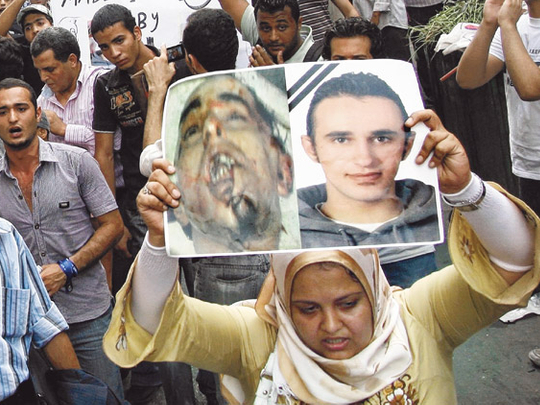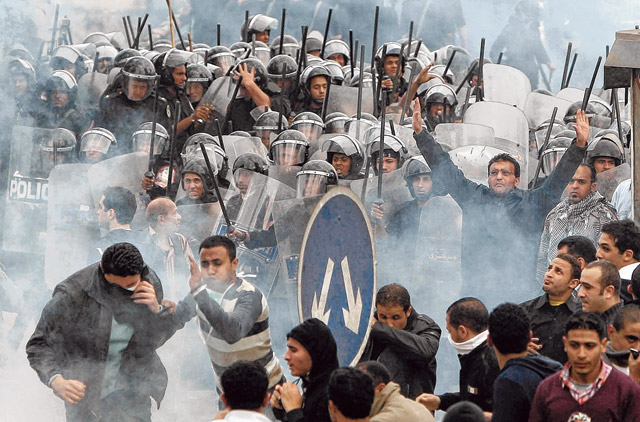
Dubai Khalid Saeed was at an internet cafe in Alexandria on June 6 last year when two security officers dragged him out and brutally beat him to death in public.
A picture of the hardly recognisable face of Saeed, taken at the morgue, was posted on the internet and became a catalyst for the Egyptian revolution of January, which ended with the overthrow of Hosni Mubarak as president.
Saeed became a victim of the emergency law, and his case has developed into a rallying cry for opponents of the "repressive state". The shocking pictures of Saeed fuelled anger and fury among his ordinary compatriots. Marches were organised in Cairo and Alexandria — where the 28-year-old Saeed was named "the martyr of the state of emergency" — and calls were made to end police brutality. A campaign for justice and accountability was named ‘We are all Khalid Saeed'.
Today, calls are growing louder to hold members of the security forces who have for decades bullied ordinary citizens to account.
Focus on past excesses
Amnesty International (AI) called for the "immediate establishment of an independent inquiry into human rights abuses committed by the much-feared State Security Investigation Service (SSI).
In a report released on Wednesday, Amnesty International also called for an immediate end to the 30-year-old state of emergency, and said that all provisions of the emergency law must be repealed.
"Under the cover of the state of emergency, [former] president Mubarak's state security forces were for years allowed to commit gross violations without fear of scrutiny or punishment," said AI's report titled ‘Time for Justice: Egypt's Corrosive System of Detention'.
"This is a moment for fundamental change," added the report, a copy of which was sent to Gulf News. "It demands immediate concrete steps from the authorities so that those responsible for serious human rights violations are held to account. Egyptians must see justice done for the human rights abuses of the past."
Emergency law was first enacted in Egypt in 1958, and then lifted only to be reimposed following the assassination of former president Anwar Sadat in 1981. Authorities promised to lift the law before the September 2011 parliamentary elections in the country. Human rights organisations say the law gives security forces sweeping powers, suspends some constitutional rights, allows the creation of arbitrary courts, circumscribes opposition political activity, restricts demonstrations, hems in civil society organisations, and legalises censorship.
Administrative detention is governed by Article 3(1), which gives the president or his deputies the power to arrest and detain any person the authorities deem to be "dangerous to public security and order".
The Egyptian Interior Ministry announced on March 15 that the SSI had been abolished, and a new national security body will be established instead. The fate of the SSI officers is still unclear, human rights organisations noted.
Yet, "Amnesty International has documented the continuing use of torture, arbitrary detention and trials of civilians before military courts and repression of freedom of expression by authorities" in recent weeks.
‘Clear message'
"The uniforms may have changed but we have seen the same patterns of abuse continue," AI's report said. "Accountability for past crimes is essential to send out a clear message that violations will no longer to be tolerated."
The case of Yahya Mohammad Khalaf Allah Ali, who was detained by the SSI, was one of the cases included in the AI report.
Speaking to Gulf News, Ali said he was only 30 when he was arrested in 1993 for alleged membership of a militant group. He was sentenced by a military court to six years in prison, but spent 12 more years behind bars in the absence of a valid detention order. Ali was only released after the revolution, and is looking to start his life all over again. The day he was released from prison, he saw the former minister of interior brought in, he said. "I swear to God that after the revolution, I didn't feel anymore the pain of the past years… I was thrilled."
Now, Ali plans to collect all his previous medical reports showing he was subjected to torture to file a complaint to bring those responsible to book.













